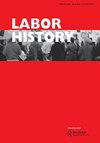Labor standards, labor policy, and compliance mechanism: a case study in Bangladesh
IF 0.7
4区 管理学
Q1 HISTORY
引用次数: 0
Abstract
The International Labor Organization (ILO) labor standard is crucial for ensuring labor rights, making it imperative for member states to adopt labor policies that align with and comply with the ILO. With this in mind, this manuscript addresses three key questions: First, what does the term ‘labor standard’ mean under the ILO? Second, does Bangladesh’s labor policy align with the ILO? Third, how can compliance with labor policy be improved to safeguard labor rights in Bangladesh? This qualitative study employs an interdisciplinary pure legal research methodology, as established by Arthurs in 1983, within the academic constituency. The findings reveal that labor legislation in Bangladesh often deviates from the ILO labor policy. In many cases, there is a lack of effective inspection mechanisms to enforce labor laws, and the penalties, incarceration, and other sanctions for labor law violations are inadequate. This leads to insufficient implementation of the law in Bangladesh, resulting in numerous violations of workers’ rights.劳工标准、劳工政策与合规机制:以孟加拉为例
国际劳工组织(ILO)的劳工标准对于确保劳工权利至关重要,因此成员国必须采取与国际劳工组织一致并遵守国际劳工组织的劳工政策。考虑到这一点,本文解决了三个关键问题:首先,“劳工标准”一词在国际劳工组织下是什么意思?第二,孟加拉国的劳工政策是否与国际劳工组织一致?第三,如何提高对劳工政策的遵守,以保障孟加拉国的劳工权利?这一定性研究采用了跨学科的纯法律研究方法,由亚瑟于1983年在学术界建立。调查结果显示,孟加拉国的劳工立法经常偏离国际劳工组织的劳工政策。在许多情况下,缺乏有效的检查机制来执行劳动法,对违反劳动法的处罚、监禁和其他制裁措施也不充分。这导致孟加拉国法律执行不力,造成许多侵犯工人权利的事件。
本文章由计算机程序翻译,如有差异,请以英文原文为准。
求助全文
约1分钟内获得全文
求助全文
来源期刊

Labor History
Multiple-
CiteScore
1.00
自引率
28.60%
发文量
44
期刊介绍:
Labor History is the pre-eminent journal for historical scholarship on labor. It is thoroughly ecumenical in its approach and showcases the work of labor historians, industrial relations scholars, labor economists, political scientists, sociologists, social movement theorists, business scholars and all others who write about labor issues. Labor History is also committed to geographical and chronological breadth. It publishes work on labor in the US and all other areas of the world. It is concerned with questions of labor in every time period, from the eighteenth century to contemporary events. Labor History provides a forum for all labor scholars, thus helping to bind together a large but fragmented area of study. By embracing all disciplines, time frames and locales, Labor History is the flagship journal of the entire field. All research articles published in the journal have undergone rigorous peer review, based on initial editor screening and refereeing by at least two anonymous referees.
 求助内容:
求助内容: 应助结果提醒方式:
应助结果提醒方式:


